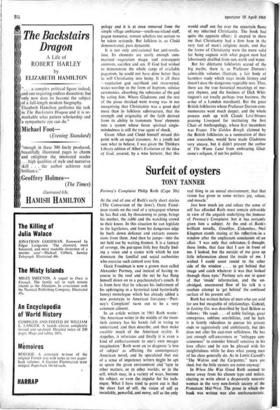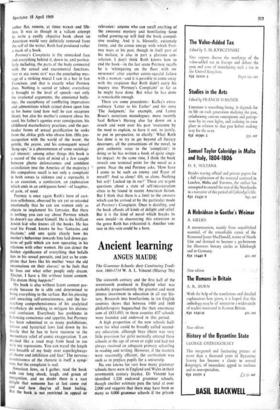Surfeit of oysters
TONY TANNER
Portnoy's Complaint Philip Roth (Cape 30s) At the end of one of Roth's early short stories ('The Conversion of the Jews'), Ozzie Freed- man stands on the roof of a synagogue whence he has fled and, by threatening to jump, brings his mother, the rabbi and the watching crowd to their knees. In this situation he can legislate to the legislators, and from his dangerous edge be hurls down defiance and extracts conces- sions from them. And then he jumps—into the net held out by waiting firemen. It is a fantasy of revenge, the put-upon little boy finally find- ing a voice and a stance with which he can dominate the familial and social authorities who exercise such control over him.
Ozzie Freedman is now a grown man called Alexander Portnoy, and instead of having re- course to the roof and the net he has flung himself down on to a psychoanalyst's couch. It is from here that he releases his indictment of his upbringing in a hysterical (and hysterically funny) monologue which has already added a new prototype to American literature—Port- noy's Complaint' turns out to be a very common ailment.
In an article written in 1961 Roth wrote: `the American writer in the middle of the twen- tieth century has his hands full in trying to understand, and then describe, and then make credible much of the American reality. It stupefies, it infuriates and finally it is even a kind of embarrassment to one's own meager imagination.' Roth went on to diagnose `a loss of subject' as afflicting the contemporary American novel, and 'he speculated that out of a sense of impotence-writers might be apt to spurn the given environment and 'turn to other matters, or to other worlds; or to the self, which may, in a variety of ways, become his subject, or'even the impulse for his tech- nique. What I have tried to point out is that the sheer fact of self, the vision of self as inviolable, powerful, and nervy, self as the only real thing in an unreal environment, that that vision has given to some writers joy, solace, and muscle.'
Just how much joy and solace the sense of self has afforded Roth must remain debatable in view of the anguish underlying• the _humour of Portnoy's Complaint, but it has Certainly given him a subject. At the end-- of, -Roth's brilliant novella, Goodbye, columbus, Klugman stands staring at his rellectiontiia.a window after the unpleasant conclusion- of.:an affair. 'I was only that substatioe01, thought, those limbs, that face that I saw in front of me. I looked, but the outside of me gave up little information -about the inside of me. I wished I could scoot round to the other side of the window . . . to get behind that image and catch wbdtever it was that looked through those eyes.' Portnoy sets out in quest of that 'inside' information, and the un- abridged, uncensored flow of his talk is a resolute attempt to `get behind' the confused surface of his present self.
Roth has written before of men who are avid for sex but incapable of relationships. Gabriel, in Letting Go, was described by Saul Bellow as follows: `He reads . . . of noble feelings, great enterprises, sublime sensibilities, and he feels it is faintly ridiculous to pursue his private ends so aggressively and ambitiously, but this does not alter his- cast-iron selfishness. He has just enough self-awareness or "unhappy con- sciousness" to consider himself sensitive in his love affairs and he can be pleased with his insightfulness while he does what young men of his class generally do. As in Lewis Carroll's "The Walrus and the Carpenter," tears are shed, but the little oysters are eaten anyway.'
In When She Was Good Roth seemed to move away from his chosen type and milieu, electing to write about a desperately neurotic woman in the very non-Jewish society of the Protestant Mid-West. The prose in which the book was written was also uncharacteristic, rather flat, remote, at times waxen 'and life- less. It was as though in fl valiant attempt to write a coolly objective book about art- American world very definitely removed from the self of the writer, Roth had produced rather a mask of a book.
Portnoy's Complaint is the unmasked face and everything behind it, down to, and particu- larly including, the parts of the body connected with the sexual and excremental functions. 'LET IT ALL HANG OUT' was the concluding mes- sage of a striking mural I saw in a bar in San Francisco, and that is exactly what Portnoy does. Nothing is sacred or taboo; everything is brought to the level of speech—not only the irrational arguments, the emotional bully- ings, the cacophony of conflicting imperatives and admonitions which rained down upon him in his home (and how well he can recapture them), but also his mother's concern about his stool, his father's agonies over constipation, his childhood masturbatory practices, and the par- ticular forms of sexual gratification he seeks from the shikse girls who obsess him. (His pre- occupation with the world of the WASP, the gentile, the goyim, and his consequent sexual 'hang-ups,' is a phenomenon of some sociologi- cal interest: among other things this book is a record of the state of mind of a Jew caught between ghetto defensiveness and confident assimilation into the America of the majority.) His compulsive recall is not only a complaint in both senses (a sickness and a reproach), it is an exorcism, a confession, an exploration which ends in an ambiguous howl—of laughter, of pain, of need.
Portnoy is once again Roth's hero of cast- iron selfishness, obsessed by sex yet so retarded emotionally that he can use women only as objects to implement his fantasies. But there is nothing you can say about Portnoy. which he doesn't say about himself. He is the brilliant - Jewish Acid who knows all the books. He has read' his ,Freud, knows he has 'fantasies. and fisations,'. and sees quite clearly how his mother's behaviour towards him laid down pat- terns. of :guilt -which are now operating in his relations with other women. He can detect the hidden significance of everything that befalls- him in his sexual pursuits, and just he com- plains that Jews like his mother 'wear the old unconscious on their sleeves,' so be feels that he lives out what other people only• dream: 'Doctor, I have a life -without latent content. The dream thing happens!'
His book is also without latent content .pre- cisely because he is able and determined to bring everything to the surface. But his piercing and unresting self-consciousness, and the far- reaching comprehensiveness of his analytical vocabulary do nothing to mitigate his distress and confusion. Everybody has problems in balancing conscience and appetite, but Portnoy has been submitted to so many prohibitions, taboos. and hysterical laws laid down by his family that he has to ha;ie recourse to the momentary relief of comic exaggeration. 'I am • marked like a road map from head to toe with my repressions. You can travel the length and breadth of my body over supeillighlays Of shame and inhibition and fear.' The nervous', inventiveness of the rhetoric is itself a symp: tom, but the complaint.is real. American Jews, so I gather, read the book with one long shock, laugh, and groan of recognition, and no doubt there is a vast delight that someone has at last come out and said how they've all been feeling. But the book is not restricted in appeal or
relevance: anyone who can recall anything of the awesome mystery and humiliating •farce called growing-up will find the book compul- sive reading. And it is, blessedly, extremely funny, and the comic energy with which Port- noy tears at his past, though in itself part of
his malaise, is also in part a glorious con- solation. I don't think Roth knows how to end the book—in the last scene Portnoy recalls he is 'whimpering on the floor with MY MEMORIES' after another comic-squalid failure with a woman—and it is possible to come away with the suspicion that Roth didn't carry his inquiry into 'Portnoy's Complaint' as far as he might have done. But what he has done is remarkable enough.
There are some precedents: Kafka's extra- ordinary 'Letter to his Father' and his story 'The Judgment,' for example, and Lenny Bruce's notorious monologues; more recently Saul Bellow's Herzog also lay down on a couch and went over his past 'overcome by the need to explain, to have it out, to justify, to put in perspective, to clarify.' What Roth has done is to try to get beyond all literary decorums, all the conventions of the novel, to give authentic voice to the 'complaint'; in doing so he has written a book of quite singu- lar impact. At the same time, I think the book reveals one terminal point for the novel as a
n. genre. Near the end Portnoy asks, 'How have I come to be such an enemy and flayer of myself? And so alone! Oh, so alone. Nothing but self! Locked up in ,ne!' These are urgent questions about a state of self-incarceration often to be found in recent American fiction. But I think that there is a limit to the answers which can be arrived at by the particular mode of Portnoy's Complaint. Once is dazzling, and the book affords all kinds of delight and relief. But it is the kind of novel which breaks its own mould—in discovering this extension to the genre Roth has exhausted it. Another ven- ture in this vein could be a bore.











































 Previous page
Previous page